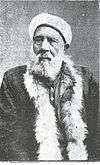Fehim Čurčić
| Fehim Čurčić | |
|---|---|
| 5th Mayor of Sarajevo | |
|
In office 14 November 1910 – 1915 | |
| Preceded by | Esad Kulović |
| Succeeded by | Aristotel Petrović |
| Personal details | |
| Born |
1886 Sarajevo, Condominium of Bosnia and Herzegovina, Austria-Hungary |
| Died |
13 February 1916 (aged 30) Grimmenstein, Lower Austria |
Fehim Effendi Čurčić (1886 – 13 February 1916) was a Bosnian politician who served as the 5th Mayor of Sarajevo from 1910 to 1915. On 28 June 1914, Mayor Čurčić welcomed Archduke Franz Ferdinand of Austria and his wife Sophie, Duchess of Hohenberg to Sarajevo and was present later the same day at their assassination, the event that sparked World War I. He died aged 30 in an Austrian sanatorium.
Early life

Čurčić was born into a prominent family of ethnic Bosniaks who relocated to Sarajevo from Livno in the late 17th century.[1] His father Ragib Čurčić (died 1888) was a statesman in the Ottoman Empire, and the final mayor of Sarajevo under Ottoman rule from March 1878 until the Austrian occupation in August of that same year.[2] The family was Muslim.
Politics
Čurčić was working as a political aspirant in administrative country service. He attended course for officers and became a spare officer. Čurčić, who was repeatedly elected to Sarajevo's City Council, will go down in history as the last mayor of Sarajevo during the Austro-Hungarian rule over Bosnia and Herzegovina. Coincidentally, his father Ragib was the last mayor of Sarajevo in 1878 during Ottoman rule.
In the 1910 election for Mayor of Sarajevo, incumbent mayor Esad Kulović won a third term by an "overwhelming" majority, but refused post, thus the position was handed over to 24-year-old Fehim Čurčić.[3] Coincidentally the last Bosnian census during Austro-Hungarian rule was conducted in the 1910 election year. Sarajevo at that time had 51,919 inhabitants. During his tenure, Čurčić opened the Chamber of Education in 1911. A year later the Kino Apolo (Apollo Cinema) was opened. Also, the city's main post office was constructed by Josip Vancaš, while the Museum of Sarajevo, as well as the Judicial Palace and the Faculty of Law building at the University of Sarajevo were constructed by Karel Pařík. Čurčić held post until 1915 when the City representation was dismissed.
1914 assassination
On 28 June 1914, Mayor Čurčić delivered a keynote address at City Hall (which is today the National and University Library of Bosnia and Herzegovina),[4] where he welcomed the Austrian Archduke Franz Ferdinand to Sarajevo with Governor Oskar Potiorek.[5][6] The first attempt on the life of the archduke failed. Čurčić rode in the first car with the Sarajevo Chief of Police Edmund Gerde and was unaware of what had transpired at the bridge.[7][8][9] The noise of the motorcade had drowned out the bomb. Gavrilo Princip managed to assassinate Ferdinand and his wife in the second attempt, an event that sparked the First World War that changed the world.
References
- ↑ "Begovske porodice Begovici i Curcici". Bosanske historije. Retrieved 10 April 2015.
- ↑ "Kulovića ulica, prvi dio". Radio Sarajevo. 13 October 2014. Archived from the original on 16 April 2015. Retrieved 10 April 2015.
- ↑ "Fehim ef. Čurčić i Sarajevski atentat". Radio Sarajevo. 20 December 2012. Archived from the original on 16 April 2015. Retrieved 10 April 2015.
- ↑ "100 godina od Sarajevskog atentata: Događaj koji je obilježio 20. vijek". Radio Sarajevo. 28 June 2014. Retrieved 10 April 2015.
- ↑ "The Harding Affair: Love and Espionage during the Great War; page 110". Google Books. 1 September 2009. Retrieved 10 April 2015.
- ↑ "First World War centenary: the assassination of Franz Ferdinand, as it happened". Telegraph. 27 June 2014. Retrieved 10 April 2015.
- ↑ "Smrt Franje Ferdinanda, druga strana Politike 16/30. juna 1914". Vreme. 28 June 2014. Retrieved 10 April 2015.
- ↑ "Man Who Shot the Man Who Shot Lincoln; page 149". Google Books. 22 November 2011. Retrieved 10 April 2015.
- ↑ "28-Jun-1914 - Assassination in Sarajevo". World War I. Retrieved 10 April 2015.